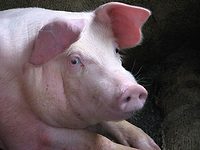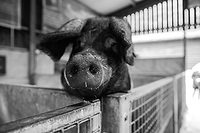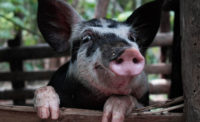U.S. Pork Industry on Alert as African Swine Fever Sweeps China

As African swine fever (ASF) continues to spread in China, there are new worries that the contagious disease could make its way to the U.S.
The U.S. Department of Agriculture (USDA) Animal and Plant Health Inspection Service summarizes the disease as:
“... a highly contagious and deadly viral disease affecting both domestic and wild pigs of all ages. ASF is not a threat to human health and cannot be transmitted from pigs to humans. It is not a food safety issue. ASF is found in countries around the world, particularly in sub-Saharan Africa. More recently, it has spread through China, Mongolia and Vietnam, as well as within parts of the European Union. It has never been found in the United States – and we want to keep it that way.”
There is worry that the disease may be introduced to the U.S. because American pork producers use feed from China for their pigs. The feed in question includes an organic soybean meal—which is high in protein content—that is sent to the U.S. from China for the purpose of feeding hogs and other livestock. Swine viruses can be transmitted through feed ingredients. ASF has nearly ruined China’s pig population, and the disease continues to spread to other parts of Asia, including Mongolia and Vietnam.
Last month, out of an abundance of caution, the National Pork Producers Council (NPPC) canceled its annual World Pork Expo that was to be held in June in Des Moines, IA.
“While an evaluation by veterinarians and other third-party experts concluded negligible risk associated with holding the event, we have decided to exercise extreme caution,” said David Herring, NPPC president and a producer from Lillington, NC. “The health of the U.S. swine herd is paramount; the livelihoods of our producers depend on it. Prevention is our only defense against ASF and NPPC will continue to do all it can to prevent its spread to the United States.”
More recently, in a Facebook update posted just this week, NPPC said,
"As African swine fever continues to spread globally, NPPC's top priority remains protecting the U.S. pork herd. We are working very closely with USDA and Customs and Border Protection to make sure that we identify and address all vulnerabilities."
Since August, a reported 129 cases of ASF in China have been reported. To date, there is no ban or quarantine on imported feedstuff from China.
Looking for a reprint of this article?
From high-res PDFs to custom plaques, order your copy today!





